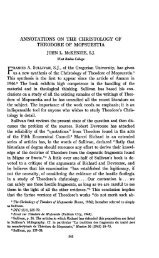Theology for Artisans of a New Humanity - Theological Studies
Theology for Artisans of a New Humanity - Theological Studies
Theology for Artisans of a New Humanity - Theological Studies
Create successful ePaper yourself
Turn your PDF publications into a flip-book with our unique Google optimized e-Paper software.
CHALLENGE OF SEGUNDO 131<br />
every system, without however failing to commit himself concretely to<br />
serving his brothers, he will assert, in the very midst <strong>of</strong> his options, the<br />
specific character <strong>of</strong> the Christian contribution <strong>for</strong> a positive trans<strong>for</strong>mation<br />
<strong>of</strong> society." Again, at the conclusion <strong>of</strong> the letter, he declares<br />
with regard to Christian organizations that "they have to express, in<br />
their own way and rising above their particular nature, the concrete<br />
demands <strong>of</strong> the Christian faith <strong>for</strong> a just, and consequently necessary,<br />
trans<strong>for</strong>mation <strong>of</strong> society." 15 Thus, in addition to the criticism <strong>of</strong> existing<br />
ideological systems, Christians are here exhorted to concrete commitments<br />
to justice and its concomitant social change ("trans<strong>for</strong>mation" in<br />
the citations). And obviously, if these commitments are to transcend an<br />
empty voluntarism, they must involve the creation <strong>of</strong> specific plans and<br />
strategies <strong>for</strong> change; in a word, they must lead to new and better<br />
systems <strong>of</strong> goals and means, that is, to new and better ideologies.<br />
Ill<br />
A last area <strong>of</strong> critical importance <strong>for</strong> Segundo's theology is ecclesiology,<br />
where he believes the Church has faced an unresolved dilemma <strong>for</strong><br />
the entire twenty centuries <strong>of</strong> its existence. The problem is succinctly<br />
phrased as follows: "Was the original Christian message aimed at<br />
masses as such, so that it must be thought out and propagated in those<br />
terms; or was it rather aimed at minorities who were destined to play an<br />
essential role in the trans<strong>for</strong>mation and liberation <strong>of</strong> the masses?" (p.<br />
209). The choice <strong>of</strong> one or other <strong>of</strong> these options entails enormous<br />
practical implications; <strong>for</strong> it will determine whether the Church's main<br />
energies and resources will be allotted to institutional expansion and<br />
preservation or to the trans<strong>for</strong>mation <strong>of</strong> the world, that is, to the<br />
construction <strong>of</strong> the kingdom. Basing his case on exegetical and metaphysical<br />
arguments, Segundo opts unreservedly <strong>for</strong> the second position.<br />
The necessity <strong>for</strong> such a decisive choice has been a central theme in<br />
Segundo's theology ever since his first published work. 16 Critical to his<br />
theory is an understanding <strong>of</strong> "mass" and "minority" behavior, which he<br />
believes underlies the dynamics <strong>of</strong> world history, as well as the entire<br />
process <strong>of</strong> evolution. In The Liberation <strong>of</strong> <strong>Theology</strong> these ideas are<br />
expressed in very summary <strong>for</strong>m, which may open them to facile misunderstanding<br />
and rejection; it would be well, there<strong>for</strong>e, to consult other<br />
works where he has elaborated his ideas in a much more detailed and<br />
15 Octogésima adveniens, nos. 36 and 51 (Gremillion, op. cit., pp. 501 and 511).<br />
16 The question is the dominant one in Función de la Iglesia en la realidad rioplatense<br />
(Montevideo: Barreiro y Ramos, 1962).
















